
The Wall is the eleventh studio album by the English progressive rock band Pink Floyd, released on 30 November 1979 by Harvest/EMI and Columbia/CBS Records. It is a rock opera that explores Pink, a jaded rock star whose eventual self-imposed isolation from society forms a figurative wall. The album was a commercial success, topping the US charts for 15 weeks and reaching number three in the UK. It initially received mixed reviews from critics, many of whom found it overblown and pretentious, but later received accolades as one of the greatest albums of all time and one of the band's finest works.
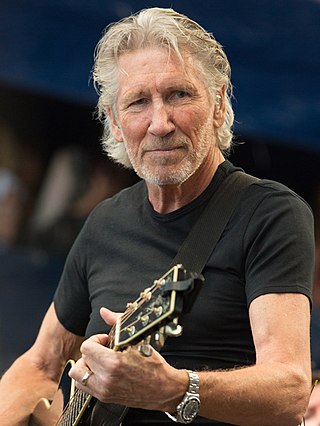
George Roger Waters is an English musician, singer-songwriter and composer. In 1965, he co-founded the progressive rock band Pink Floyd as the bassist. Following the departure of singer-songwriter Syd Barrett in 1968, Waters also became the band's lyricist, co-lead vocalist and conceptual leader until his departure in 1985.

The Final Cut is the 12th studio album by the English rock band Pink Floyd, released on 21 March 1983 through Harvest and Columbia Records. It comprises unused material from the band's previous studio album, The Wall (1979), alongside new material recorded throughout 1982.

Amused to Death is the third studio album by English musician Roger Waters, released 7 September 1992 on Columbia. Produced by Waters and Patrick Leonard, it is mixed in QSound to enhance its spatial feel. The album features the late Jeff Beck on lead guitar on several tracks. The album's title was inspired by Neil Postman's 1985 book Amusing Ourselves to Death.

The Pros and Cons of Hitch Hiking is the first solo studio album by Roger Waters, bassist/songwriter and co-founder of English rock band Pink Floyd; it was released in 1984. The album was certified platinum in the United States by the Recording Industry Association of America in April 1985.
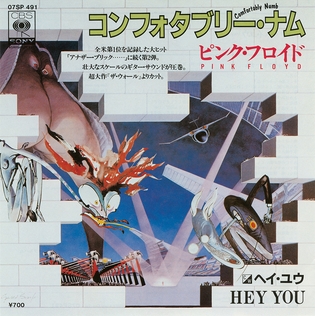
"Comfortably Numb" is a song by English rock band Pink Floyd from their eleventh album, The Wall (1979). It was released as a single in 1980, with "Hey You" as the B-side. The music was composed by guitarist David Gilmour. The lyrics were written by bassist Roger Waters.

77 Sunset Strip is an American television private detective drama series created by Roy Huggins and starring Efrem Zimbalist Jr., Roger Smith, Richard Long and Edd Byrnes. Each episode was one hour long when aired with commercials. The show ran from 1958 to 1964. The character of detective Stuart Bailey was first used by writer Huggins in his 1946 novel The Double Take, later adapted into the 1948 film I Love Trouble.

Radio K.A.O.S. is the second solo studio album by English rock musician Roger Waters. Released on 15 June 1987 in the United Kingdom and June 16 in the United States, it was Waters' first solo studio album after his formal departure from the band Pink Floyd in 1985. Like his previous and future studio albums and many works of his during his time with Pink Floyd, the album is a concept album based on a number of key topical subjects of the late 1980s, including monetarism and its effect on citizens, popular culture of the time, and the events and consequences of the Cold War. It also makes criticisms of Margaret Thatcher's government, much like Pink Floyd's The Final Cut (1983), another album conceived by Waters.
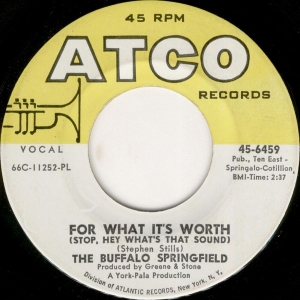
"For What It's Worth " is a song written by Stephen Stills. Performed by Buffalo Springfield, it was recorded on December 5, 1966, released as a single on Atco Records in December 1966 and peaked at No. 7 on the Billboard Hot 100 chart in the spring of 1967.

"When the Tigers Broke Free" is a Pink Floyd song by Roger Waters, describing the death of his father, Eric Fletcher Waters, on 18 February 1944, during the Battle of Anzio during the Italian Campaign of the Second World War.
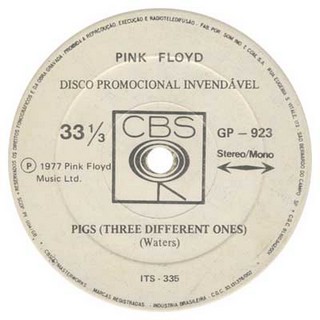
"Pigs (Three Different Ones)" is a song from Pink Floyd's 1977 album Animals. In the album's three parts, "Dogs", "Pigs" and "Sheep", pigs represent the people whom Roger Waters considers to be at the top of the social ladder, the ones with wealth and power; they also manipulate the rest of society and encourage them to be viciously competitive and cut-throat, so the pigs can remain powerful.

"Young Lust" is a song by English rock band Pink Floyd, released in 1979. It is the ninth track on the band's eleventh studio album The Wall (1979). The lyrics to the song are about the band throwing themselves into the headlong of hedonism, sex, drugs, and rock and roll.

"Run Like Hell" is a song by the English progressive rock band Pink Floyd, written by David Gilmour and Roger Waters. It appears on the album The Wall. It was released as a single in 1980, reaching #15 in the Canadian singles chart and #18 in Sweden, but it only reached #53 in the U.S. A 12" single of "Run Like Hell," "Don't Leave Me Now" and "Another Brick in the Wall " peaked at #57 on the Disco Top 100 chart in the U.S. To date, it is the last original composition written by both Gilmour and Waters, the last of such under the Pink Floyd banner, and is the last composition ever recorded by all four members of the classic 70s-era Floyd lineup together, within their traditional instrumental roles of Waters on bass, Gilmour on guitars, Nick Mason on drums, and Richard Wright on keyboards, on the same song.

The Wall – Live in Berlin was a live concert performance by Roger Waters and numerous guest artists, of the Pink Floyd studio album The Wall, itself largely written by Waters during his time with the band. The show was held in Berlin on 21 July 1990, to commemorate the fall of the Berlin Wall eight months earlier. A live album of the concert was released 21 August 1990. A video of the concert was also commercially released.
"Two Suns in the Sunset" is the closing track on Pink Floyd's 1983 concept album The Final Cut, and Roger Waters' final chronological contribution to the band, before leaving in 1985.
Stephen Hawking (1942–2018), a theoretical physicist, has appeared in many works of popular culture.

"The Tide Is Turning (After Live Aid)" is the closing track from Roger Waters' second studio album, Radio K.A.O.S. It was released as the album's third single, in November 1987. A live version of the song was released as the second single from Waters' debut live album, The Wall – Live in Berlin in November 1990.
K.A.O.S. On the Road was a concert tour performed by Roger Waters in 1987 in support of the album Radio K.A.O.S. (1987). The shows included material from the album as well as songs from well known Pink Floyd albums such as The Dark Side of the Moon (1973), Wish You Were Here (1975) and The Wall (1979). The tour started in North America on 14 August 1987 and ended on 22 November 1987 with two performances at Wembley Arena in London, England.
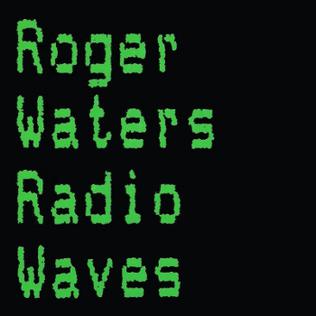
"Radio Waves" is the opening track from Roger Waters' second solo studio album, Radio K.A.O.S. It was chosen as the lead single for the album, released worldwide in May 1987
The Sunset Strip is the name given to the mile-and-a-half (2.4 km) stretch of Sunset Boulevard that passes through West Hollywood, California.

















